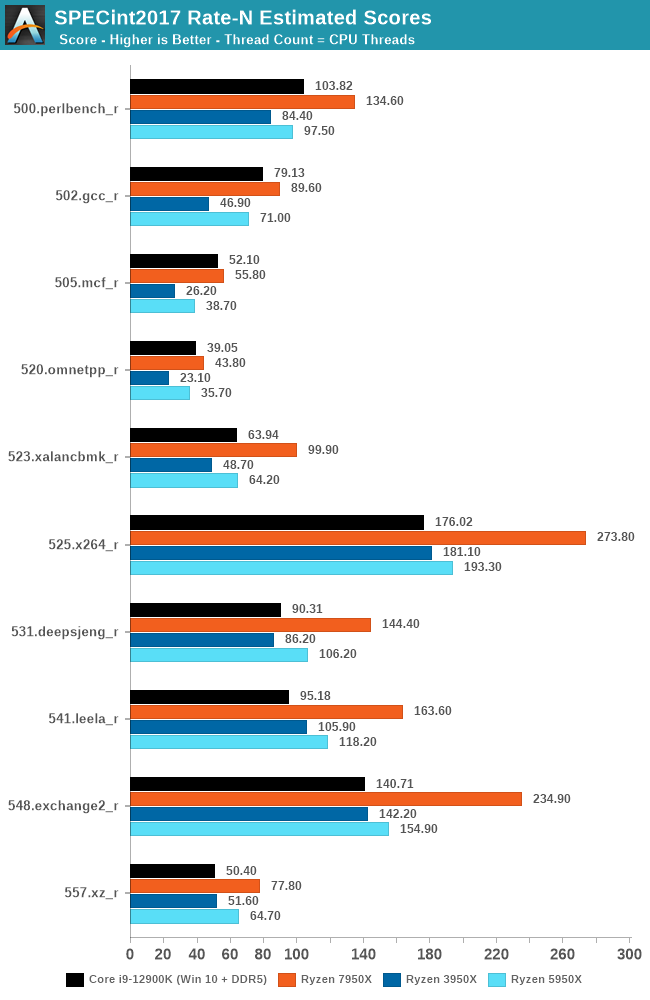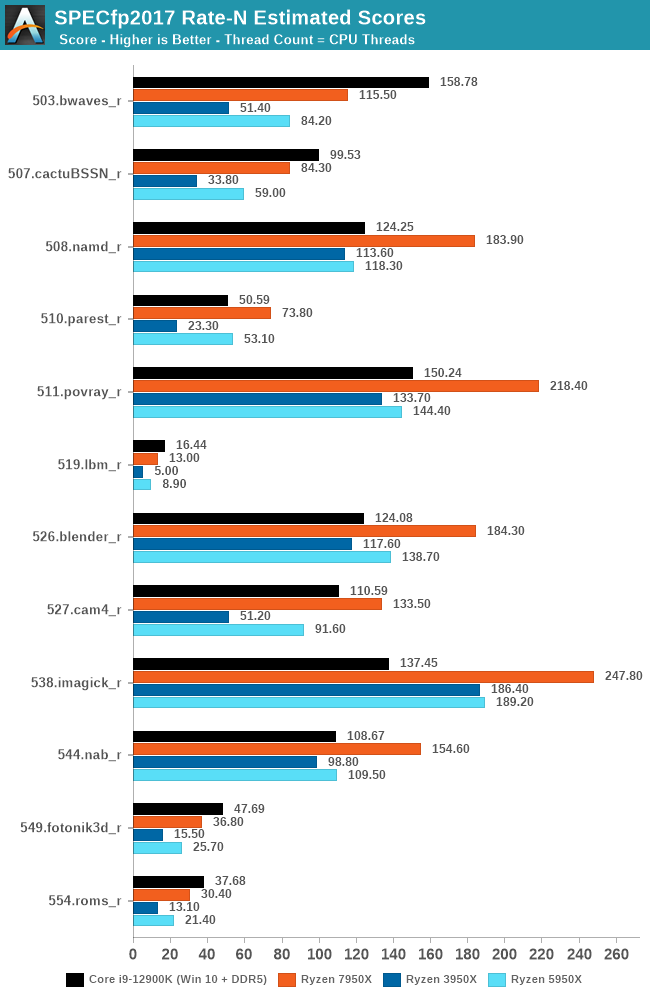AMD Zen 4 Ryzen 9 7950X and Ryzen 5 7600X Review: Retaking The High-End
by Ryan Smith & Gavin Bonshor on September 26, 2022 9:00 AM ESTSPEC2017 Multi-Threaded Results
Although single-threaded performance is important and Zen 4 has a clear advantage here, multi-threaded performance is also very important. Some variables to consider when evaluating multi-threaded performance is that desktop processor designs typically boost a single core higher, with the rest lagging in frequency behind to either stay under the thermal (TJMax) or power (TDP) envelopes. Some manufacturing processes are more efficient by design due to extensive R+D and product management, with Zen 4 looking to be much more in terms of perf per watt over Intel's Alder Lake architecture.
In the instance of the AMD Ryzen 9 7950X, it has a clear advantage over its predecessors in that it not only has a higher single core boost (5.7 GHz versus 4.9 GHz), but it also has a higher TDP than the Ryzen 9 5950X (170 W versus 105 W. This increase in TDP not only allows for a higher frequency, but it allows for a higher frequency spread across all of the cores when under full load.

Opening up our look at our SPECint2017 NT results, and we see a similar uplift in performance gains as we did in the single-threaded tests. In tests such as 500.perlbench_r, the Ryzen 9 7950 is 38% ahead of AMD's previous generation Ryzen 9 5950X, which is impressive. In 523_.xalanbmk_r, the Ryzen 9 7950 is 55% ahead of the Ryzen 9 5950X, and over 100% better in performance over the Zen 2-based Ryzen 9 3950X.

In our SPECfp2017 NT testing, certain workloads such as in 538.imagick_r showed massive increases in performance over previous generations, with a 30% uplift in performance over Zen 3. The difference here between Zen 3 and Zen 2 was marginal (10%), but Zen 4 is a more efficient core architectural design, with many improvements across the board playing a hand here; the switch to DDR5 versus DDR4, more cache per core, higher frequency, higher TDP, etc.
Overall AMD's Zen 4 architectural differences and improvements show that not only does AMD have the crown for single-threaded performance, but it's also ahead in multi-threaded performance too, at least from our SPEC2017 testing. As always when Intel or AMD makes a claim on IPC performance increases, AMD seems to be about right with claims of around 29% in ST performance and even more so in MT performance.










205 Comments
View All Comments
vortmax2 - Sunday, October 16, 2022 - link
Some people don't want to limit TDP themselves. Nothing wrong with that. ReplyTechie2 - Tuesday, September 27, 2022 - link
What a screwed up launch of Ryzen 7000 CPUs and AM5 mobos by e-tailers. DDR5 EXPO DRAM showed up online a few days ago. On 9-27-22 it looks like e-tailers are actually hiding the four Ryzen 7000 CPUs to sell older stock. The AM5 mobos which have been sitting in inventory for weeks were not posted online until early morning instead of at midnight as in the past. You'd think by now they could figure out how to do a proper launch of a new CPU or platform but evidently not when it's AMD.No consumer grade Gen 5 SSDs listed by e-tailers that I could find. Are PC builders suppose to just wait until Nov. to see if they actually show up? AMD's partners may be cooperating with AMD but the purchasing experience is a piss poor sales methodology being employed IMNHO.
YMMV Reply
nandnandnand - Tuesday, September 27, 2022 - link
AMD said weeks ago that PCIe 5.0 SSDs would be coming in November.Nobody should be buying this stuff on day 1 unless they like being findom'd by corporations. Reply
yhselp - Tuesday, September 27, 2022 - link
First-draft-copy issues aside, this article is written exceptionally well. The information is excellent and extensive as usual, but I feel like there's been a step-up in the way its presented/explained. Kudos and thank you. Replyyhselp - Tuesday, September 27, 2022 - link
it's* goddamit Replyvortmax2 - Sunday, October 16, 2022 - link
Great post. So many grammar police on here that can't help but criticize and take away from the actual purpose of the article. ReplyHardwareDufus - Tuesday, September 27, 2022 - link
Clearly both manufacturers are producing vey compelling products this time around. At the $600-$700 mark we have two CPUs trading blows; R9-7950X (Zen4) & just announced i9-13900K (RaptorLake) We will have updates of both lines, with AMD adding 3D Cache and Intel increasing Boost Speeds. Probably can't go wrong with either choice, neither one dominates the other completely.I think I'll bite this time around. Yeah I know Zen5 will be a new architecture and Intel will adopt chiplets and all of the benefits that accompany them... But, I think either one of these chips, probably available in volume in 1st quarter 2023, will serve most folks well.
In the case of Intel, you can continue to use DD4 and 600 series chipsets. However really take advantage of the capabilities of the chip, DDR5 and motherboards featureing 700 series chipsets will be available, on par with Zen 4 requiring a DDR5 and otherboards featuring the new AM5 socket and 600 series chipsets. Apples to Apples when comparing the requirements to go ALL In on performance. Reply
HardwareDufus - Tuesday, September 27, 2022 - link
Dang, that was some awesome typing I just did there... Replynandnandnand - Tuesday, September 27, 2022 - link
3D cache will dominate over a couple hundred extra MHz in frequency (13900KS). ReplyHifihedgehog - Tuesday, September 27, 2022 - link
@nandnandnand: That may well be true, but that's the future and months out yet. Ryzen 7000 non X3D has to sell between then and now or AMD is not going to be posting a pretty quarter. The 13900K is far cheaper in platform and unit price and will meet or exceed the 7950X for now. DDR5 and AM5 motherboards coupled with a higher price will be Ryzen 7000 series undoing, and good too. AMD needs to realize people purchase because of intrinsic quality, not brand loyalty. Reply